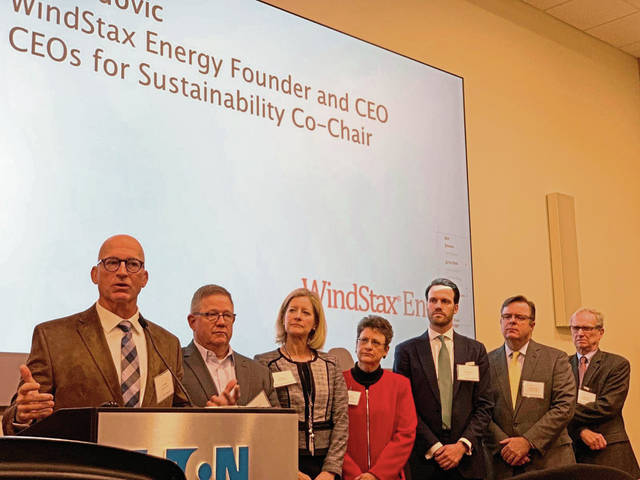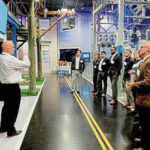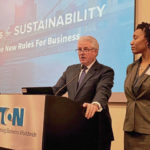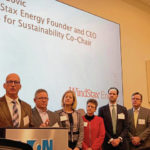Companies increasingly are going beyond what federal mandates require when it comes to reducing their negative impact on the environment and quality of life of residents.
It’s not because benevolent company leaders want to do charity work, but because their investors, employees and consumers are demanding it, said Jerry MacCleary, CEO of North American operations for Covestro AG. The chemical and plastics maker is a Bayer spinoff with more than 700 employees based in Robinson.
“It’s not just the right thing to do, it’s the only thing to do,” MacCleary said. “If you don’t have sustainability embedded in your business as a strategy, your innovation strategy or in your values, they’re not going to invest in you, and they’re not going to work for you. Your company will not be sustainable.”
Some examples of sustainability efforts:
• Turning old rubber hoses and cafeteria food waste into useable energy.
• Renovating a 75-year-old building for a growing company’s headquarters rather than building a new one.
• Developing career-track training programs and getting better at gauging employee needs and job satisfaction.
Momentum is mounting for Western Pennsylvania companies of all types to set and track progress in reaching so-called “sustainability goals” — outcome-based efforts ranging from reducing energy and water use to cultivating a more skilled and diverse workforce.
Region’s top executives seek answers
Leading the charge in the region is CEOs for Sustainability, a council of locally based top executives that has grown to include more than 40 companies and counting. Participants comprise the heads of a mix of small businesses and startups as well as multibillion-dollar global corporations across several types of industries — chemicals, manufacturing, financial, food services, health care, technology, hospitality, transportation, retail and others.
Collectively, their companies make nearly $60 billion in total annual revenue.
“These sustainable goals are not just for big companies,” said WindStax Energy CEO Ronald Gdovic, who co-chairs the coalition’s advisory council along with Covestro’s MacCleary. “They should be practiced and can be adopted from the bottom up.”
Among the coalition’s participants: Eat’n Park, Giant Eagle, Koppers, Oxford Development, DMI Companies, eLoop, Sota Construction Services Inc., Duquesne Light, Signature Financial Planning, Huckestein Mechanical Services and the Pittsburgh Pirates.
Nonprofit advocacy group Sustainable Pittsburgh is guiding their work, and UPMC Health Plan is sponsoring the council, which includes funding various events, workshops and marketing needs.
“This is a group that brings together industry, government, nonprofit and philanthropy to identify innovation and best practices and share them across all of our industries,” said Craig Stevenson, president of AUROS Group, a Carnegie-based company focused on helping companies optimize energy use and indoor air quality of their buildings.
CEOs for Sustainability has grown from just 17 executives when it was founded nearly three years ago.
RELATED: Western Pa. CEOs want to improve environment, quality of life
“At that time, it seemed like kind of a novel idea,” Gdovic said. “But I think we’ve come very far in these three years and will continue to expand. We have a lot further to go, and we’re inviting other CEOs from around the region to join us.”
Message: Not job-killer, bad for business
The coalition aims to squash the notion that efforts to address the impacts of climate change necessarily mean job-killing regulations that are bad for business.
“We want to grow the economy. We want to make sure that we have quality of life for all,” MacCleary said. “We also want to take care of the precious environment, and we can do that if we work together.”
Efforts to improve the region’s environment can go hand in hand with profitability and job creation — no matter what conflicting messages may be coming from the White House, several of the group’s executives said.
Monitoring and lowering electricity consumption, for instance, will reduce utility costs, as will using efficiency and energy-savings solutions. Emitting less pollution will lower the need for future remedies such as pricey cleanups.
Federal government ‘can’t stop us’
The trend is happening regardless of conflicting moves and messages from the White House, including President Donald Trump’s controversial 2017 decision to withdraw the United States from the Paris global agreement aimed to get as many countries as possible working harder to mitigate the impacts of climate change.
Trump has repeatedly said since — including during his visit to a Marcellus shale industry conference at the David L. Lawrence Convention Center last month — that he “represents Pittsburgh, not Paris” in his decision to pull out of the Paris Accord.
Trump also boasted that he “ended the war on American energy” and cited his expectations for growth in the coal, steel and manufacturing sectors while making fun of windmills and the notion of abandoning plastic straws.
“Our air is as clean as it’s been in decades,” Trump said during his last speech in Pittsburgh. “We’re at a very, very good point environmentally right now.”
RELATED: Pittsburgh region gets F grade for air quality
Pittsburgh Mayor Bill Peduto has dismissed Trump as being stuck in an “outdated 19th-century mindset.”
Peduto joined the leaders of more than 200 cities and 2,000 businesses that publicly reaffirmed their individual commitments to the Paris agreement, as well as United Nations and other globally accepted standards.
“The federal government certainly has a role to play. But I think it’s incumbent upon the business community, the public, local and state governments to lead the charge,” said Charles Toran, president and owner of Sci-Tek Consultants, a civil engineering firm with offices in Pittsburgh, Washington and Philadelphia. “If there’s any silver lining about this process that we’ve unfortunately had to go through with the withdrawal from the Paris climate accords is that it’s energized everybody else to step up and be responsive and say, ‘OK, we certainly want the federal government included, but we can do this without the federal government.’
“It is happening, and the federal government has been a partner in the past and will be in the future,” he said.
The government “can do things to enable us, but they can’t stop us,” echoed Stevenson, of AUROS in Carnegie.
“If I can build a building that uses less energy from carbon and has better air quality and indoor environmental quality, then I get to the value side of this — which is the people,” Stevenson said. “[Company leaders] are making economic and business decisions, and we don’t need them to lead us.“
Several dozen business leaders convened Thursday to learn more about the CEOs for Sustainability at an event dubbed “The New Rules of Business,” held at Eaton power management company’s The Eaton Experience in Marshall Township.
“At Duquesne Light, sustainability is not just a short-term priority. Sustainable growth for our region is vitally important for our company’s success,” Steven Malnight, CEO of Duquesne Light, told the room filled with executives at Thursday’s event. “We’re not alone. That’s true for every company that’s here.”
Participating CEOs say the move toward becoming a “sustainable small business” can start small, such as taking better advantage of natural light, using refurbished furniture, fixing leaky faucets, buying more local goods and services, choosing to occupy a building more than 50 years old. Benefits can include not only cost savings but attracting new customers, improving brand recognition, increasing competitive advantage.
The recruitment event ended with a tour of The Eaton Experience and highlights on how the power management company is working to improve the use of solutions such as microgrids, electric vehicles and stored energy.
Among internal goals Eaton has achieved in recent years:
- Eaton worked to reduce waste by reuse, recycling, composting and incineration that produces energy. The company decreased the amount of waste it generates by 3.4 percent last year, a reduction of nearly 2 million pounds of trash. Just 13% of Eaton’s total waste in 2018 was sent to a landfill.
- By hiring Ongweoweh, an American Indian-owned company, to make wood pallets, Eaton reduced the number of pallet suppliers needed and recycled 659,000 pounds of pallet material, for an estimated savings of 7 percent by 2020.
- An Eaton hose manufacturing plant in Turkey is converting old rubber hoses into usable energy via an energy-recovery incineration process, and turns its cafeteria waste to renewable energy through biodigestion and methane recovery.
For more information, go to CEOsforSustainability.org.













